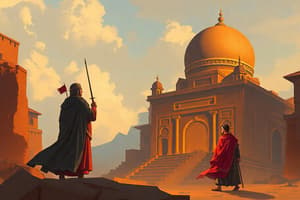Podcast
Questions and Answers
What does the Greek word historia mean?
What does the Greek word historia mean?
- To predict future events
- To document facts
- To entertain
- To inquire knowledge through investigation (correct)
Who is known as the 'father of history'?
Who is known as the 'father of history'?
- Thucydides
- Plato
- Herodotus (correct)
- Socrates
What is the title of Herodotus' first book?
What is the title of Herodotus' first book?
- The Chronicles
- The Records
- The Histories (correct)
- The Accounts
Which ancient regions are covered in Herodotus' writings?
Which ancient regions are covered in Herodotus' writings?
What is the primary focus of linguistic studies?
What is the primary focus of linguistic studies?
In what century did modern linguistics begin to develop?
In what century did modern linguistics begin to develop?
What does phonetics primarily concern itself with?
What does phonetics primarily concern itself with?
What discipline reached its peak in the 19th century alongside modern linguistics?
What discipline reached its peak in the 19th century alongside modern linguistics?
Which of the following scholars contributed to modern linguistics?
Which of the following scholars contributed to modern linguistics?
What is the main focus of phonology?
What is the main focus of phonology?
Which field of political science compares theories across different nations?
Which field of political science compares theories across different nations?
Which of the following is NOT a component of the discipline of political science?
Which of the following is NOT a component of the discipline of political science?
What does semantics study in language?
What does semantics study in language?
Which philosopher is associated with the foundation of political science?
Which philosopher is associated with the foundation of political science?
What does syntax concern itself with?
What does syntax concern itself with?
In what centuries was political science predominantly developed by American scholars?
In what centuries was political science predominantly developed by American scholars?
What is the main concept introduced by Cooley?
What is the main concept introduced by Cooley?
How do individuals perceive themselves according to the looking glass self concept?
How do individuals perceive themselves according to the looking glass self concept?
Who is traditionally known as the primary developer of symbolic interactionism?
Who is traditionally known as the primary developer of symbolic interactionism?
What does Blumer argue regarding people's behavior?
What does Blumer argue regarding people's behavior?
According to Blumer, what influences the meanings individuals have regarding their behaviors?
According to Blumer, what influences the meanings individuals have regarding their behaviors?
What significant aspect differentiates Blumer's argument from earlier theories?
What significant aspect differentiates Blumer's argument from earlier theories?
What is one of the basic premises of symbolic interactionism according to Blumer?
What is one of the basic premises of symbolic interactionism according to Blumer?
Which phrase effectively summarizes the looking glass self concept?
Which phrase effectively summarizes the looking glass self concept?
What is the primary focus of rational choice as defined by Levin and Milgrom?
What is the primary focus of rational choice as defined by Levin and Milgrom?
What does utility maximization involve?
What does utility maximization involve?
Which of the following best describes the 'structure of preferences' concept?
Which of the following best describes the 'structure of preferences' concept?
How do individual actions contribute to social change, according to rational choice theory?
How do individual actions contribute to social change, according to rational choice theory?
What social classes did Karl Marx identify in his social conflict theory?
What social classes did Karl Marx identify in his social conflict theory?
What does rational choice theory predict about decision-making?
What does rational choice theory predict about decision-making?
What historical development does Marx associate with the division of society into social classes?
What historical development does Marx associate with the division of society into social classes?
How can rational choice be used to understand social phenomena?
How can rational choice be used to understand social phenomena?
What is one purpose of a dowry in many societies?
What is one purpose of a dowry in many societies?
In which region are arranged marriages mentioned as traditional?
In which region are arranged marriages mentioned as traditional?
What does filial piety emphasize in Chinese society?
What does filial piety emphasize in Chinese society?
What is a characteristic of government laws according to the provided information?
What is a characteristic of government laws according to the provided information?
What does the law as a coercive institution impose on people?
What does the law as a coercive institution impose on people?
According to the Catechism of the Catholic Church, what does the Church have the right to announce?
According to the Catechism of the Catholic Church, what does the Church have the right to announce?
What is compadrazgo described as?
What is compadrazgo described as?
What varies worldwide concerning individual income tax?
What varies worldwide concerning individual income tax?
Flashcards are hidden until you start studying
Study Notes
History and Historiography
- Origin of the word "history" comes from the Greek historia, meaning "to inquire knowledge through investigation."
- Herodotus, known as the "father of history," authored HISTORIES, documenting ancient traditions and cultures of Greece, Asia, and Africa.
Linguistics
- Study of linguistic structure, acquisition, and evolution began in the 18th century, peaking in the 19th century.
- Key components of linguistics include:
- Phonetics: Focuses on the sounds of language.
- Phonology: Examines the structure and organization of sounds.
- Syntax: Studies the arrangement of words and phrases to create meaningful sentences.
- Semantics: Concerns the meaning of words and language.
Political Science
- Political science emerged as a distinct discipline in the 19th and 20th centuries, primarily driven by American scholars.
- Major subfields include:
- Comparative Politics: Analyzes political systems of different nations for theory comparison.
- Public Policy Analysis: Examines the development and impacts of public policies.
Symbolic Interactionism
- Developed by Herbert Blumer, building on George Herbert Mead's work, emphasizing meaning derived from social interactions.
- Proposes three basic principles:
- Human actions are driven by meanings ascribed to things.
- Meanings are derived from social interactions and can evolve over time.
- Self-perceptions are influenced by how individuals interpret others' perceptions.
Rational Choice Theory
- Rational choice theory posits that individual actions are based on maximizing utility while minimizing costs.
- Core concepts include:
- Utility Maximization: Choosing options that provide maximum reward for the lowest cost.
- Structure of Preferences: Making decisions based on personal goals and means to achieve them.
- Centrality of Individuals: Individual decisions can lead to broader social outcomes, such as collective action.
Marxism and Social Conflict
- Karl Marx's theory of social conflict highlights the division between the bourgeoisie (capitalists) and proletariat (working class).
- Society is characterized by competition for resources like food, education, and employment, rooted in capitalist structures.
Cultural Practices
- Arranged marriages, traditional in various regions such as Africa and Southeast Asia, often involve families determining suitable partners based on wealth.
- Filial piety represents a significant virtue in Chinese culture, emphasizing respect and obedience to parents.
- Concept of compadrazgo signifies ritual co-parenthood, establishing social ties among adults.
Formal Institutions
- Laws serve as coercive social institutions, enforcing compliance through sanctions and penalties.
- Religious institutions, like the Catholic Church, assert authority in moral and social matters, influencing the behaviors and decisions of its members.
Studying That Suits You
Use AI to generate personalized quizzes and flashcards to suit your learning preferences.




